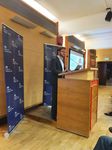LOOKING BACK, AND LOOKING AHEAD
←
→
Page content transcription
If your browser does not render page correctly, please read the page content below
ADVANCE STUDY MARCH 2022 NEWSLETTER
LOOKING BACK, AND LOOKING AHEAD
WE'VE COME A LONG WAY
It's amazing to think that it's been nearly seven years since the first ADVANCE participant walked through the
doors of Headley Court for his first ADVANCE visit in August 2015. Since that day, we have seen 1,145 participants
for their baseline visits and 665 for their first follow-up visits, we have published the first ADVANCE findings on
cardiovascular risk and are expecting the mental health findings to be out before summer, and we have grown the
ADVANCE team from just a few members to more than 20 people! What a great journey it has been so far, and we
are only at the start of it - the study will continue for at least another 15 years. We look forward to seeing our
participants for their other four follow-up visits over the coming years - and it's mind boggling to even try and think
about the amount of exciting data that will be collected from all those study visits.
SPREADING THE WORD ON ADVANCE
The word about ADVANCE has been spreading fast in the last few months. After the
publication of the first ADVANCE baseline cardiovascular risk results, the study was Find us on
featured in an editorial of the journal Heart, and other news stories were published
online. ADVANCE work was also presented at the Office for Veterans' Affairs Research social media!
Summit in February. You can scroll down to read more about this. In this newsletter you
will also find a brief video summarising the baseline cardiovascular risk findings.
IN OTHER NEWS...
We are excited to let you know that the ADVANCE TBI (traumatic brain injury)
study is kicking off soon. Read more about it a couple of pages down. We have
also included a brief video explaining why the ADVANCE cohort is special in
terms of TBI.
As always, thank you to all our participants for making ADVANCE the amazing
project it is today. This time we want to say a special thank-you to the
ADVANCE Participant Panel who met for the third time in January. Find out
what was on the agenda further down in this newsletter.
E-mail us at: Call us on: Visit our website:
dmrc-advancestudyteam@mod.gov.uk +44 (0)1509 251 500 extension 3408 advancestudydmrc.org.ukADVANCE cardiovascular risk findings in short
Watch the brief video on the left for a summary of the
ADVANCE baseline cardiovascular risk findings.
The video is a clip from the ADVANCE webinar held in
December with Dr Christopher Boos. Dr Boos leads on
cardiovascular research within the ADVANCE study.
You can watch the full webinar here.
For more videos on ADVANCE research and the study
in general, head over to our YouTube channel.
If you would like to be interviewed about your
experience with ADVANCE, get in touch. We can't
promise worldwide fame, but we will try our best to offer
a good chat!
ADVANCE in the news
After the publication of the first ADVANCE baseline cardiovascular risk results, the study
received quite a lot of press attention. For example, ADVANCE was featured in an
editorial of the scientific journal that published the research results. The editorial, called
'Forever wounds of the forever war', was written by Dr Ian Stewart (US Air Force) and
can be read here. In the text he reflects on the consequences of the Afghanistan conflict,
the long-term complications of combat injury and the research done by ADVANCE.
The Office for Veterans' Affairs Research Summit
The Office for Veterans' Affairs Research Summit took place in February,
and the ADVANCE team were invited to attend and give presentations.
ADVANCE PhD student Dan Dyball (pictured) and King's College London
lead for ADVANCE Prof Nicola Fear presented the ADVANCE baseline
mental health findings. In addition, ADVANCE project board member Prof
Anthony Bull gave a presentation on the burden of injury from recent
conflicts. Dr Howard Burdett, ADVANCE research fellow, presented a
poster on the ADVANCE-INVEST transition study. There is a lot going on
at ADVANCE at the moment!
THE THIRD ADVANCE PARTICIPANT Have your contact
PANEL MEETING details changed?
The ADVANCE Participant Panel met for the third time on 19th of
January. The panel plays a vital role in how the study is conducted,
and it was another productive meeting. On the agenda this time were
Let us know by contacting us
the ADVANCE baseline mental health findings, the results booklet directly or by completing our online
that participants receive after their ADVANCE visits wearable Contact Form via this QR code:
technology to monitor activity levels, and the ADVANCE-INVEST
transition study, which looks at military to civilian transition.
The participant panel meetings are chaired by Anna Verey,
ADVANCE research assistant from King's College London. Feedback
from the panel is reported back to the ADVANCE project board.
Huge thanks to all members of the participant panel. The panel's input
really helps shape the study and steer it in a direction the participants
feel is right.ADVANCE TBI gets off the ground
In one of our 2021 newsletters we told you about the ADVANCE TBI study that looks
at traumatic brain injury (TBI) in the ADVANCE cohort. After a lot of preparation, we
now have all the TBI staff in posts, and we will soon start inviting participants to take
part in the study.
One of the researchers working on the TBI study is Dr Neil Graham, a clinical lecturer
in neurology from Imperial College London. We caught up with him to chat about the
study, and in the below video clip Neil explains what makes the ADVANCE cohort
especially interesting in terms of TBI. You can watch the full interview here.
Our aim is to first of all define what kind of
injuries the ADVANCE participants have had.
And we then want to look at, in great detail,
the consequences of those injuries.
The tests the participants will undergo if they take part in the TBI
All eligible ADVANCE participants will be offered study include an MRI brain scan, blood tests to look at
the chance to take part in the TBI study. biomarkers in the blood, genetic tests and memory tests.
PARTICIPANT VIEW: Stuart Stirling
Age: 50 Rank: Sargent
When and where were you deployed? I was posted out to Afghanistan and
Iraq three times, the first time being the hardest. In 2008 I was deployed to
Afghanistan for a month, then posted to the Red Arrows in Scampton, Lincoln.
Why did you choose to take part in ADVANCE? To benefit young guys in the
military - I think the research is very important for future treatment and care of
our soldiers. I also thought it would be good to get a health check-up every few
years. Your fitness level must be good when you’re in the military, but with no
fitness tests to pass after leaving the military you don’t tend to think about it.
How did you find your ADVANCE visits? Very enjoyable. Everyone is
friendly, chatty and very professional.
What was the best part of the ADVANCE day? X-ray and DEXA are very interesting, and the debrief at the end of
the day is informative.
What have you been up to since you left active service? I work at Babcock RAF Wittering fixing aeroplanes. I
work with many of my friends from our Afghan days. The best thing about working there is seeing all the new men
and women coming in very nervous, and then 20 hours later they can fly a plane. Great to see the young ones
having the skills for the future.
What's your favourite way to spend your weekends? Going to the park with
the grandkids and socialising with friends, although all the pubs seem to be
closing down, which is sad.
Stay with the What are your top film and book of all time? 'Shawshank Redemption' (1994)
ADVANCE Study until and 'Barefoot Soldier' by Johnson Beharry.
the end, see it What three words would you use to describe your experience with
through. ADVANCE? Friendly, professional and informative.
Have you got any words of wisdom for your fellow ADVANCE
participants? Stay with the ADVANCE Study until the end, see it though.MEET THE TEAM - STEFAN SPRINCKMÖLLER
What is your role within ADVANCE? As a database manager, I am involved in
the processing, structuring and cleaning of all data collected from the
ADVANCE participants. I work closely with the clinical team and researchers,
sort of acting as the middle man between data collection and data analysis.
What jobs have you had before joining ADVANCE? I have been working in
jobs related to public health and data management over the past five years. In
the UK, I worked as a data manager for the Intensive Care National Audit &
Research Centre (ICNARC), and before that in the US I worked as a research
coordinator at the University of Massachusetts Medical School.
What do you enjoy most about your job? Working for something that has a
larger purpose. Data is a catalyst for change. We are collecting great amounts
of meaningful data over a long period of time. This allows us to understand the
past and present 'pictures' of our participants. These pictures push us to go Stefan waiting for Peruvian
beyond the numbers and make informed decisions that will shape policy and food in a Peruvian restaurant,
future outcomes in the real world. in his Peru jersey.
What are the biggest challenges of your job? The What's the weirdest habit you developed during
biggest challenge is definitely 'we have all of this data, lockdown? Consciously and unconsciously singing
so what?'. We can collect thousands of data points, 'Happy Birthday' while washing my hands (you are
but it is crucial to understand the stories behind the supposed to wash your hands for the whole song!).
data and what they are telling us, and then act on
What's your favourite meal? Ceviche, and all
those stories. This is a huge challenge for everyone
Peruvian food (I am Peruvian).
involved.
If you could see all our participants together, what What's your favourite drink? Inca Kola, a soft drink
would you say to them? You are the heart of from Peru. It tastes like bubble gum or cream soda,
ADVANCE. Having worked in other clinical studies, and it seems to be a love or hate relationship. For me,
including ones with participants from the Armed it’s just love.
Forces, ADVANCE stands out due to its length and
What was no. 1 in the UK charts on the day you
type of information that is being collected, and we are
were born? 'Love Is All Around' by Wet Wet Wet. I did
making a difference together. Thank you for choosing
not know this song! I am more of a fan of #63, a cover
to be part of ADVANCE.
of 'Smells Like Teen Spirit' by Abigail.
What's the last book you read? 'The Tombs of
What three words would your friends or partner use
Atuan' by Ursula K. Le Guin. Highly recommend to all
to describe you? Funny, caring and persevering.
fantasy fans!
Hello and goodbye
In January we said goodbye to our wonderful research nurse Guy
Fraser. We will miss him as, we are sure, will our participants. Good
luck to Guy in his new adventures!
But it's not all teary goodbyes, as we have also welcomed new people
to the ADVANCE team. Sam Paul, MRI radiographer started in Alison
February. She brings with her several years of radiography
experience and will be working on the ADVANCE TBI study. So if you
are taking part in the TBI study, you will have the pleasure of meeting
Sam.
A very warm welcome also to Alison Hever who joined ADVANCE as
a study administrator in February. She brings with her a wealth of
administration and communication experience. Alison will be
contacting the ADVANCE participants to arrange their follow-up visits,
Sam
so expect a friendly hello from her when you are next due in.YOUR ADVANCE DAY EXPLAINED: Amputee
Mobility Predictor (AMP)
All ADVANCE participants with lower limb amputations undergo some extra tests
when they come to Stanford Hall for their ADVANCE visits. These tests are done
mainly to assess the participants’ mobility and how well they are able to perform
certain functional movements. We use a tool called the Amputee Mobility
Predictor (AMP) to do this.
The AMP is a quick and easy tool, and the tests involved take no more than 15
minutes to do. The tests are slightly different for people with prostheses
(AMPPRO tests) and without prostheses (AMPnoPRO tests).
The things we look at with AMP include sitting ability, going from sitting to standing, standing ability and balance,
and walking – at different speeds, over obstacles and up and down stairs. Each function is then scored, and the
total score over all the tests is calculated and correlated to the AMP scoring system which has five bands, from K-
Level 0 to K-Level 4. K-Level 0 corresponds to minimal mobility and not having the ability or potential to walk or
transfer safely without assistance, and a prosthesis does not enhance quality of life or mobility. K-Level 4
corresponds to very good mobility and having the ability to move very well with a prosthesis.
The AMP is a reliable tool and has a good validity against other commonly used tests, such as a the 6-minute walk
test and the Amputee Activity Survey. This means that the AMP can be used widely by different clinicians to get the
same scores when testing patients.
As the ADVANCE participants return to Stanford Hall for their follow-up appointments, the AMP is a quick stock
check to see how they are faring over the years. It’s an easy assessment and can highlight any issues very quickly.
The test leaves little place to hide, so we can see who has good technique with their prostheses (or not!) and how
this changes over time. We are also able to look at differences in mobility between unilateral and bilateral
amputees, and people with below knee and above knee amputations.
HEADLEY COURT
CHARITY
We look forward to speaking to you soon!
E-mail us at: Call us on: Visit our website:
dmrc-advancestudyteam@mod.gov.uk +44 (0)1509 251 500 extension 3408 advancestudydmrc.org.ukYou can also read



























































